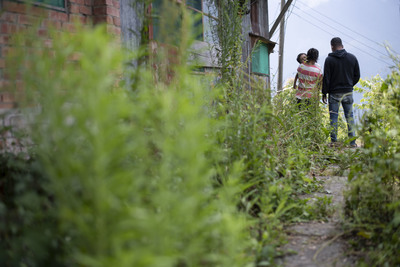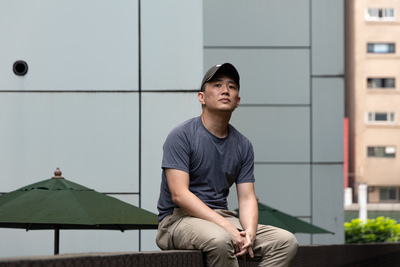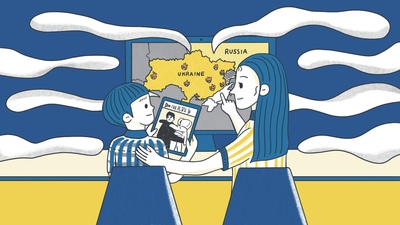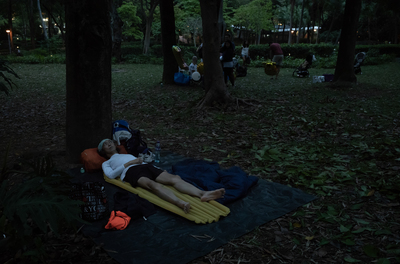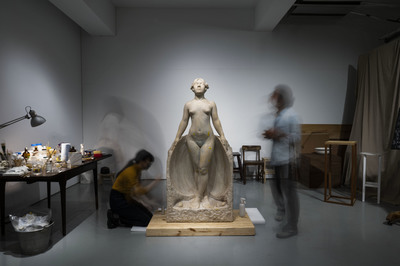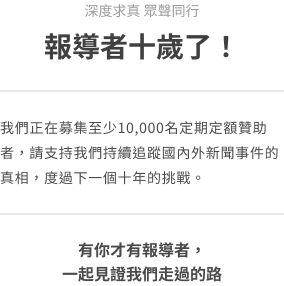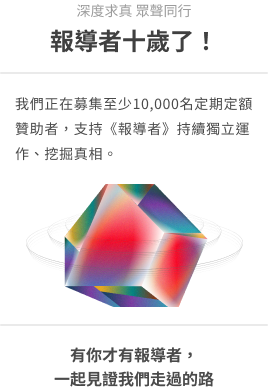Reader's Opinion
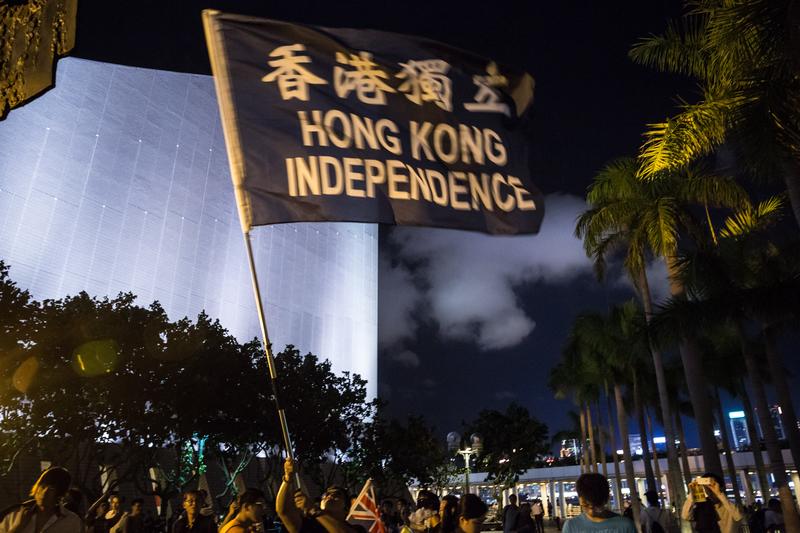
For young people in the post-Umbrella Movement era, life in Hong Kong is like a dystopia, nervously awaiting the next political crisis. There's a handful of slogans and keywords that are supposed to describe Hong Kong's situation - "economic development", "one country, two systems", "the Chinese Communist Party" and "democracy". There's also a handful of ideas to make all these contradictory statements work together, like "restore the economy", "bring about real democracy", "reclaim the central government" and even "strive for independence."
But when all is said and done, there's one slogan that no one wants to hear any more: "the horse races will go on, and the night clubs will stay open," a phrase used by Deng Xiaoping (鄧小平) to imply Hong Kong's smooth handover from the UK to China.
So do young people think there's still some twinkle left in the old Pearl of the Orient? Or has Hong Kong become a paradise lost? Writer Patrick Cheng (鄭子健) speaks with his friends to learn about the "political imaginations" of young people in Hong Kong.
"We hate Japanese imperialism because Japanese imperialism oppresses us. There is absolutely no such thing in the world as love or hatred without reason or cause."Mao Zedong, Talks at the Yan'an Forum on Literature and Art. May 23, 1942.
(To protect the safety of the individuals interviewed, we've used pseudonyms throughout the text.)
On the night of our interview, it wasn't too hot. After dinner, I sit down with Yip Hong-wang (葉康宏) on a wooden bench under a canopy; we chatted happily, each of us with a beer in our hands.
As Hong-wang finishes off his beer, children kick a football around the park, old people shout gregariously at each other, and small dogs scurry around their masters' legs. His hands caress the empty beer can, and he gazes into the dark. He's a little sheepish when he talks about his love for Hong Kong (and his loathing of China).
"If you talked about Hong Kong independence a year ago, people would look at you funny, but there's been a lot of progress recently, and it's no longer a taboo topic."
Hong-wang lived in the UK for five years, where he went to high school and university, and English loan words checker his speech.
He harkens back to the Umbrella Movement, when on September 27, 2014, the day after students from the Hong Kong Federation of Students (HKFS) and Scholarism poured into Hong Kong's Civic Square, Hong-wang brought up some sound equipment to the makeshift stage, and worked with other demonstrators to block the police from entering the square.
That night, he pulled an all-nighter, and fainted from exhaustion and heatstroke. He woke up the next evening in a hospital bed. Back at the square, police surrounded protesters, and fired tear gas at protesters. Upon hearing the news, he checked out of the hospital and hurried home to drop off his stuff. As he headed back out, his father desperately blocked the front door, and he wasn't able to join the protesters.
Two years later, the "Fishball Revolution" erupted, when police officers harassed street vendors in Mong Kok, and protesters in black fought back.
During the Umbrella Movement, Hong-wang weathered police beatings. He says that officers armed to the teeth are only the beginning, and violence would only escalate. He's willing to die for Hong Kong's independence, but thinks he's of more use to the cause if he's alive, and won't be sacrificing his life in vain.
Just a few years ago, I used to think "preparing for death" (死的覺悟) was something that only happened in ultra-violent anime or manga. I never dreamed people here would think about this idea, or regard it as a necessary preparation for the future of Hong Kong.
On the eve of Occupy Central, editors from the student-run HKU magazine Undergrad (學苑) published their newest theme issue, titled Hong Kong Nationalism (香港民族論). In the issue preface, deputy editor Keyvin Wong Chun Kit (王俊杰) writes that nations are born through a combination of "objective conditions" and "subjective imaginations". In Wong's view, Hong Kong already has a clear geographic scope, and citizens share a mutual language and economic livelihood.
In short, there's already a model in place for a distinct Hong Kong nationality. Wong also cites a recent HKU poll that shows more than half of respondents aged 18-29 consider themselves to be pure Hong Kong people.
Yip Hong-wong, an advocate of Hong Kong independence, doesn't hesitate on this question, he's a pure "Hong Konger." Hong-wang lacks the academic polish of a Keyvin Wong and doesn't care if Hong Kong fulfills the "objective conditions" to be considered an independent polity.
"Hong Kong really doesn't have a well-established or long history, but we at the very least have a unique culture here, don't we?"
He hesitates when asked to give an example, and says Hong Kong's long-standing practice of importing Thai spices has changed the locals preference for salty foods.
Hong-wang claims swear words have a local flavour here too. North of the Shenzhen river in China's Guangdong province, when people say the phrase "what the fuck?" in Cantonese, they use the word hei1 (閪) — a rude word for a woman's reproductive organ. In Hong Kong however, local use the word nan2 (撚) — a rude word for a man's reproductive organs — to say the same phrase.
It could be said that building a nation isn't the same as seeking independence, but a nation is entitled to become an independent state. If "independence" is our goal, says Keyvin Wong, then "supporters need to have a consciousness about it," and their conviction can't be rattled by the Chinese Communist Party. During the Umbrella Movement, a participant once told me that the purpose of the protest was to dismantle the mirage that China and Hong Kong "are of the same family." In the process of the 79 day sit in, those young Hong Kongers gained their first “national memory” and the determination to separate was formed.
Yip Hong-wang tells a different story. He didn't need the movement to form a new identity, his awakening occurred while studying abroad in England for five years.
When he was a first-year student, he remembers a Chinese classmate would ask him "are you Chinese, or aren't you?"
"What's the big deal?" he answered sheepishly. "Why are we looked down on if we say we're from Hong Kong, and not China?"
The following year, the university held an Asian cuisine festival event on campus, and students from China, Hong Kong and Taiwan each opened their own food stalls to sell some hometown snacks. But the Chinese students had strength in numbers, and demanded the Hong Kong and Taiwan students take their respective national flags draped on their stands. Hong-wang was furious, and mumbled out "Chinese dogs" right in front of them.
He shared a dorm with lots of Chinese students in the three years he lived on campus; one of his roommates was a girl from Shanxi, a province in north-central China. They were good friends, and spoke about nearly everything, but they argued at least once a month over the future direction of Hong Kong.
At the time, he wasn't pining for independence, only that Hong Kong could maintain the Basic Law, which guarantees Hong Kong's separation from China. But Hong-wang's patriotic friend said his "petty desires" were unreasonable, and that Beijing will certainly take direct control of Hong Kong in 2047 -- the end date of the "one country, two systems" framework. If Hong Kong resists, she said, then China's armed forces will have to intervene. All of their arguments ended this way. Hong-wang could feel the authoritarian nature of "one country" was deeply rooted in the people of China, and concessions would never be possible.
His identity as a Hong Konger was challenged daily, and his despair only grew. Since there's no room for change, he thought, then the year 2047 must be end of the "one country, two systems" framework. It's better to suffer a short-term pain than a long-term one, and fighting for independence now is better than suddenly losing everything further down the road.
After returning to Hong Kong upon his graduation in 2014, Hong-wang had already become a hardened Hong Kong independence advocate.
"It doesn't matter if I die fighting for this, after all, the Hong Kong I know and love will be gone after 2047."
When I ask what are the chances of the movement's success, Hong-wang shoots back a quick answer — "zero." It seems this hardened independence worker doesn't have a superiority complex after all.
His Hong Kong compatriots studying in the UK weren't very serious, and only knew how to have fun. It sometimes seemed like his classmates from China had a better understanding of Hong Kong's political situation. Hong-wang sneers at the pro-democracy camp's push for greater "civic nationalism" and believes the opposition Democratic Party "sold out" Hong Kong citizens when it accepted watered down democratic reforms in 2010. There's no need for Hong Kong to wait until 2047 to be swallowed up by China, says Hong-wang, "democracy is totally inefficient here, and I don't care if it starts practicing fascism."
When the weak come up against the strong, they don't necessarily fight to the death. When a marriage breaks up, the couple compromises and deals with it. So why is it so hard to make difficult decisions in the case of China and Hong Kong? Hong-wang then begins on his family history, which has subtly shaped his attitudes towards Hong Kong independence.
"I haven't spoken to my parents in months, and haven't given them any housekeeping money for a long time either." Wang-hong isn't happy with his family situation, and said his parents treated him harshly growing up. "If I forgot to turn off the light after going to the bathroom, I'd get beat for that. If my sister cried for any reason, they'd hit me for that too."
On local politics, his father supports the pro-democracy camp and his mother supports the pro-Beijing camp. His ancestors originate from a village in Dongguan, Guangdong province; his grandfather was the first of his family to come to the city, swimming to British Hong Kong under the cover of the night. His father grew in Hong Kong, but he's embraced his grandfather's roots in Dongguan, and knows the name of every relative and family friend in his ancestral village. One of his relatives even served in the National People's Congress as a deputy representing Hong Kong.
Hong-wang started to rebel against his parents in junior high. He felt nothing for his ancestral roots, and grew restless on family visits to Dongguan. His grandfather would scold him, saying "we Chinese value the connection with our hometown." Hong-wang would reply "but I'm not Chinese, my hometown is Hong Kong." He said those words in a moment of anger, and his support for independence had yet to take form.
Years later, sitting on a park bench, he lifts his head, and says to me casually, "I don't know what came first, my distaste for my Chinese identity, or my desire to rebel against my parents."
We're used to using metaphors to describe the world, a country can be a machine, it can also be a company. In Hong-wang's case, the country is a family, and he's expected to sacrifice his individual freedoms. He's decided to resist both at all costs, he wants to be rid of his unreasonable parents, and rid of Chinese oppression.
Some pro-independence advocates, like Keyvin Wong, fret that Hong Kong nationalism will quickly slide into unrestrained populism without a strong backbone of "civic values" and a "democratic movement." But Yip Hong-wang says democracy isn't enough, and that it spoils more than it helps; only fascism will survive. His views on independence come from his personal experience, and there's no use for people who trumpet glorious history and culture. I doubt he would care if we stuck a "Hong Kong populist" label on his head. This four-eyed bookworm might be a fanatic, but he's not a brainless one.
He knows an independent Hong Kong would lead to a vicious cycle, and Beijing would certainly use force to suppress the city. Hong-wang doesn't seem to mind, and says the only difference is the timing. Will it be an "early death" now, or a "late death" in 2047?
So does he plan to fan the flames in Hong Kong? Of course, the city needs a crisis to solidify its identity, and that's the only hope for something different. "If China loses a big battle, then Hong Kong has a chance at independence."
Yip Hong-wang said the chance was zero before, but he keeps a more optimistic figure for independence locked in his head. he still won't put money on it though. He has permanent resident rights in the UK, but he's never considered moving back. He doesn't want to become like the Israelites of two millennia ago, forced to live in a foreign land, preserving their culture from afar.
Two hours go by in the blink of an eye. I finally get the chance to take a swig of my beer, I didn't drink at all during the interview. It's a midsummer night, and our backs are sweating. I've heard enough of Hong-wang's fairy tales for one night, and I decide to tell one of my own.
It's 1949, and the bitter Chinese Civil War has finally come to an end. Chiang Kai-shek (蔣介石) succeeded in vanquishing his enemies, and all that's left of the Chinese Communist Party is smoke and ashes. Since then, the Republic of China has moved from an autocratic regime to a democratic one.
Or maybe there's another scenario. The tragedy of June 4th, 1989 never happened, and Zhao Ziyang (趙紫陽) succeeded in becoming supreme leader after the death of Deng Xiaoping in 1997. The country is on course for democratic reform, and the end of the party-state regime.
I ask Hong-wang, if you could take a 30,000 foot perspective on China's development, would you still push for Hong Kong's independence?
"I've never thought about it like that," he says, and then ponders for a while. "I read Chin Wan's (陳云根) On the Hong Kong City-State (香港城邦論) once; he writes that a democratic China wouldn't be conducive to Hong Kong's autonomy, but I don't know whether that's true or not. If I could pick one of the fairytales, I might go with the Republic of China version of events."
But he quickly snaps back to reality, and says fairy tales are just that, fairy tales, and that it's pointless to entertain these alternate futures. "I want to choose my destiny." He doesn't want Hong Kong's fortunes to depend on China, for better or worse.
I ask one last practical question. "What if you had money, a home and a wife, would that change your mind?" Hong-wang smiles and says "I probably wouldn't be so brave, but it wouldn't shake my faith. Hong Kong people love money, and I love money too. But not everything can be solved with money."
(To read the Chinese version of this article, please click: 【香港人的政治想像1】世上沒有無緣無故的恨:一個港獨份子的自白 )
深度求真 眾聲同行
獨立的精神,是自由思想的條件。獨立的媒體,才能守護公共領域,讓自由的討論和真相浮現。
在艱困的媒體環境,《報導者》堅持以非營利組織的模式投入公共領域的調查與深度報導。我們透過讀者的贊助支持來營運,不仰賴商業廣告置入,在獨立自主的前提下,穿梭在各項重要公共議題中。
今年是《報導者》成立十週年,請支持我們持續追蹤國內外新聞事件的真相,度過下一個十年的挑戰。


